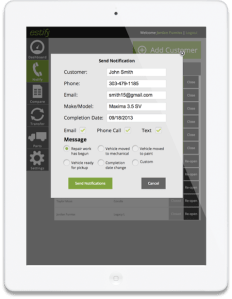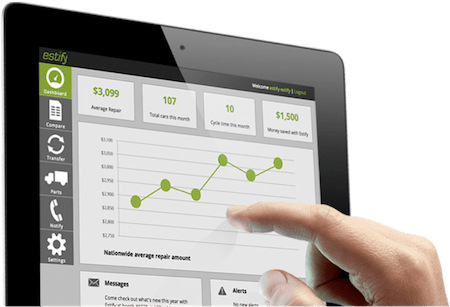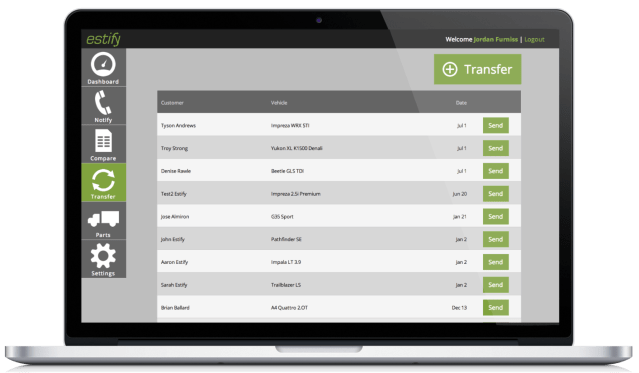The collision industry probably doesn’t rank at the top of the “Sexy Markets” list for startups, but sometimes the most obscure, fragmented and pulchritudinously challenged industries can offer the most opportunity to those willing to grit their teeth and immerse themselves in the mess. Estify, a graduate of Amplify LA’s business accelerator, is doing just that. Co-founders Jordan Furniss, Derek Carr and Taylor Moss went looking for the most unsexy market they could find, with bonus points awarded for both size and level of inefficiency. They quickly found their Shangri-La: The collision and auto repair market.
But the co-founders are web developers and designers by trade, and, knowing that this put them at a disadvantage in an industry where engineers are scarce and trust is crucial, they immersed themselves. After months of talking to shops, owners, mechanics, parts providers and insurers and identifying the biggest pain points, they began developing Estify.
Sure, the startup may not become a billion-dollar company, but this is a great, quick lesson for entrepreneurs: It’s impossible to avoid failure, but before you start building an app or product, take time to understand the market you’re tackling, what it’s problems are and how its businesses work. Go be an apprentice if you have to; it’s the least you can do, and a step that points you in the right direction.
While the auto repair industry may be unsexy, Furniss tells us, it’s also probably likely that the town or city you live in has at least one auto repair shop. In fact, there are about 45,000 in the U.S. today, the co-founder says, and most of them are using the same tools for inventory, interfacing with insurance companies and data entry they have for years.
The company is also expanding its potential addressable market by not only going after the 45,000 repair shops, but by offering its service to the whole pipeline, Estify wants to reach the 200,000 shops, insurance companies, independent appraisers and parts providers out there. To do that, the startup has built a suite of cloud-based services that aim to help make shops, and related service providers a way to increase efficiency and save money.
By helping collision repair shops automate the data entry process, among other things, Furniss claims that the company’s SaaS product can save these businesses up to two hours on every estimate they process — something repair shops have traditionally done manually. The startup recently emerged from limited beta, and had been testing the product with a handful of early customers, so it doesn’t have many paying customers yet.
However, Furniss says that the company spent its long beta period attempting to validate its pricing model and functionality and has been encouraged by the feedback. In one weekend, he says, the founders received emails from over 100 different shops that wanted to use the product, with a handful of them offering to pay for a full year in advance.
To help it push forward with a full-scale launch, add to its current team of six and start selling more broadly to repair shops, insurance providers and parts dealers, Estify recently closed on a $800K round of seed capital, led by ff Venture Capital, with participation from Romulus Capital, REES Capital and Amplify.LA.
As to what Estify actually does? At launch, the startup will be offering a suite of web services containing three main products, which can all be managed and viewed through its web-based dashboard. The first tackles what Furniss says is one of the biggest problems faced by repair shops — called “rekeying.” Essentially, rekeying is the process of duplicating the estimate that the insurance company originally wrote into the collision shop’s own estimation processes.
“It’s almost hard to fathom for those with tech backgrounds,” he says, “but these two systems don’t communicate and there’s no data bridge between them, whatsoever.” The process can add up to two hours to the estimate writing process, so Estify tries to solve this by allowing shops to bridge the gap and eliminate the redundant work of “rekeying.” The second product, Reconcile, tackles a similar pain point, in that it helps repair shops be more efficient about how they deal with estimates and the interface with insurance companies.
Virtually every collision shop has to work with insurance company, Furniss says, since they are typically the ones paying for the work. Of course, insurance companies want to spend the least amount money on each repair as possible, while the shop generally wants to be as thorough as possible and get paid for the parts and work.
“There’s a whole negotiation process that takes place with every repair and then what the insurance company says and what the shop says,” the co-founder explains, “need to be reconciled down to the penny.” This is a tedious process and shops spend hours on it with each repair, because if they don’t, they stand to lose $1,000 per repair, on average. So, the startup gives shops software to reduce this process to something that can happen in seconds, allowing them to make more money per repair while saving time — at least that’s the idea.
The third area Estify attempts to help shops increase efficiency has to do with parts. When a car is being repaired, a shop gets its parts from various providers in the area, often dealerships, which usually happens via phone and fax. Naturally, faxing the list of parts a shop needs to dealers until finding the right part is, well, time consuming, slow and inefficient.
To help speed the process up, Estify’s service automatically pulls the list of parts from shops and sends them out to a network of part providers, geographically targeting the proximate dealers. Instead of calling or faxing, dealers can just respond online, saying they have the part and can send it by such and such a time. Besides helping repair shops get better answers more quickly, Furniss says, the idea is also to create new opportunities for parts providers.
 To monetize, the startup has opted for a monthly subscription model, allowing shops, dealers and insurers to use any combination of the three, paying for what they use, with the monthly rate falling somewhere between $99 and $500. By the industry standards, Furniss says, “we’ll be able to do fairly well revenue-wise if can get a couple thousand customers on board — at least that’s where we want to start.”
To monetize, the startup has opted for a monthly subscription model, allowing shops, dealers and insurers to use any combination of the three, paying for what they use, with the monthly rate falling somewhere between $99 and $500. By the industry standards, Furniss says, “we’ll be able to do fairly well revenue-wise if can get a couple thousand customers on board — at least that’s where we want to start.”
It may be obscure and it may not be sexy, but as long as Estify continues to apply the K.I.S.S. principle to its software and product development, it could turn out to be a fairly attractive business. By removing some serious pain and friction from critical processes and operations these businesses deal with on a daily basis and doing that with a web-based solution, Estify can be scalable and potentially tap into some decent margins.
As it rounds out its feature set beyond repair shops — and builds out mobile offerings — it can expand its functionality and potentially reach a wider audience and bigger market. And one that isn’t exactly saturated with competitors. At which point the collision repair and parts industry doesn’t sound so bad after all.
Estify at home here.

